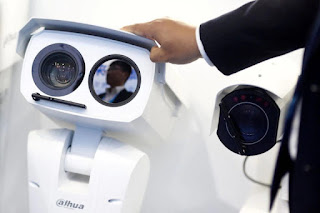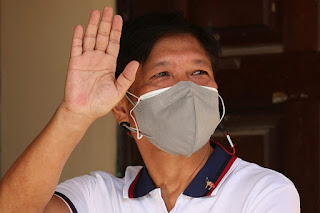Myanmar's junta expands the use of Chinese camera surveillance systems in more cities, according to sources
XEM THÊM :
Xì Dách Online TOP trò chơi dễ ăn tiền nhất 2022
SINGAPORE — According to three people with direct knowledge of the situation, Myanmar's junta government is installing Chinese-made cameras with facial recognition capabilities in more cities across the country.
According to those who are or have been involved in the projects, the plans in tenders to procure and install the security cameras and facial recognition technology are described as safe city projects aimed at maintaining security and, in some cases, preserving civil peace.
According to information from three people who asked not to be identified for fear of retaliation by the junta, local authorities have begun new camera surveillance projects for at least five cities, including Mawlamyine, the country's fourth-largest city, since the February 2021 coup.
According to sources and local media, the new projects are in addition to five cities where camera systems marketed as crime prevention measures were either installed or planned by the previous government led by Aung San Suu Kyi.
A junta spokesman did not respond to Reuters' requests for comment. The junta controls all ten municipal governments, none of which responded to requests for comment. Reuters was unable to review the tenders or visit the cities to verify camera installation.
According to one of the sources who was briefed on the junta's plans on two separate occasions, the junta is planning camera surveillance systems for cities in each of Myanmar's seven states and seven regions.
The extent of the junta's efforts to deploy camera surveillance systems has not previously been reported.
Click here to see the graphic:
CCTV surveillance systems installed throughout Myanmar CCTV surveillance systems installed throughout Myanmar
According to the three sources, the tenders were won by local procurement firms such as Fisca Security & Communication and Naung Yoe Technologies Co. The cameras and some related technology are sourced from Chinese surveillance behemoths Zhejiang Dahua Technology (Dahua), Huawei Technologies Co Ltd, and Hikvision, according to the three sources.
Both Fisca and Naung Yoe, which are based in Yangon, did not respond to requests for comment.
Reuters requests for comment were not returned by Huawei or Dahua. Hikvision stated in a statement that it has never sold directly to Myanmar government officials and that its customers in overseas markets are distributors and integrators. It also stated that it had not sold facial recognition technology into the country.
Hikvision did not respond to questions about whether it is aware of any cases in which its hardware capable of running facial recognition software has been sold into Myanmar.
According to the three sources, Myanmar procurement firms that win tenders sometimes use facial recognition software developed by local and regional companies because Chinese software licenses are expensive. They did not identify the software firms.
Concerns about surveillance
Many cities around the world use closed-circuit television (CCTV) or video surveillance systems to deter crime. Face recognition software, which is becoming increasingly controversial, is also being used, with the technology gaining traction in the United States for law enforcement purposes. Artificial intelligence is used in some sophisticated systems, such as those used in Chinese cities, to match real-time images of people against a database of images.
People with direct knowledge of the Myanmar projects and human rights organizations expressed concern that the new projects could be used to crack down on activists and resistance groups, both of which were designated as terrorists by the junta following the coup.
They were unable to produce proof of the junta's intentions.
"Surveillance cameras pose a serious risk to (Myanmar's) democracy activists because the military and police can use them to track their movements, figure out connections between activists, identify safe houses and other gathering places, and recognize and intercept activists' cars and motorcycles," Human Rights Watch Deputy Asia Director Phil Robertson told Reuters.
Myanmar's junta is conducting extensive surveillance. According to Reuters, it has installed intercept spyware at telecom and internet providers to eavesdrop on its citizens' communications and deployed "information combat" units to monitor and attack dissenters online.
According to Nyi Thuta, a former captain who defected from the military in late February 2021, the army has officers dedicated to analyzing surveillance camera feeds. He did not know how many officers were assigned to this task, but he did describe visiting CCTV control rooms staffed by soldiers in the capital, Naypyidaw. Reuters was unable to confirm this independently, and a junta spokesman did not respond to a request for comment.
ten towns
Shortly after the election, Mawlamyine held a tender for a camera surveillance system.
According to the two sources, Fisca and Naung Yoe won the Mawlamyine tender jointly. According to one source, Fisca won the tenders for Dawei and Taunggyi, and each city has seen hundreds of Dahua cameras installed this year.
According to another source, there are now over 200 Dahua cameras in Mawlamyine, with more on the way.
According to one source, Dahua cameras were installed this year in Myitkyina, the capital of Kachin, a region of ethnic unrest, and the government of Hpa-an city has begun preliminary discussions about a camera system.
According to local media and two sources, Suu Kyi's government installed CCTV cameras in Naypyidaw and Yangon, Myanmar's largest city, before the coup, and Mandalay also signed an agreement with Huawei for a camera surveillance system.
According to one source, Huawei cameras were combined with facial recognition software in Naypyidaw. According to another source, the surveillance system in Yangon is made up of a Hikvision traffic command center and a variety of camera brands.
According to two sources, the junta has directed Mandalay, Myanmar's second-largest city, to install cameras more quickly since the coup. According to one source, at least 300 Huawei cameras were installed prior to the coup, with hundreds more to follow.
According to two sources, the city of Bagan, a historic tourist destination, held a tender for a camera surveillance system prior to the coup.
CCTV systems with Huawei cameras have been deployed by Myanmar's security forces in the city of Sittwe and some villages in the state of Rakhine, where the military is battling an ethnic armed group, according to one source.
READ ARTICLES :
READ ARTICLES :




Nhận xét
Đăng nhận xét